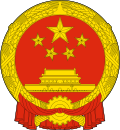President of the People's Republic of China
| President of the People's Republic of China | |

|
|
| Emblem of the People's Republic of China | |
|
Acting President Xi Jinping since March 14, 2013 |
|
| Official seat | Zhongnanhai |
| Term of office | 5 years (unlimited re-election possible) |
| Creation of office | September 27, 1954 June 18, 1983 |
| Last choice | March 14, 2013 |
| Salutation | 主席 or zhǔxí (Mr. President) |
| Deputy | Vice President of the People's Republic |
| website | english.gov.cn (en) |
The President of the People's Republic of China ( Chinese 中華人民共和國 主席 / 中华人民共和国 主席 , Pinyin Zhōnghuá Rénmín Gònghéguó Zhǔxí , English Chinese People Republic Chairperson ; until 1982 Chairman of the Chinese People Republic ) is the head of state of the People's Republic of China . He actually has a representative function, but there was in the history of the People's Republic of China President, in personal union also general secretary of the Communist Party were. In the case of Mao Zedong or the incumbent President Xi Jinping , who are the leaders of all three pillars of the People's Republic of China's political system (party, government, armed forces), the unofficial title of "Supreme Leader of the People's Republic of China" ( Chinese 中華 chines共和國 最高 領導人 , Pinyin Zhōnghuá Rénmín Gònghéguó Zuìgāo lǐngdǎo rén ) used.
qualification
According to the Constitution of the People's Republic of China , the President must be a Chinese citizen with full voting rights and be at least 45 years old.
Election and term of office
The President and Vice-President are elected by the National People's Congress. His term of office corresponds to that of the People's Congress of five years and, as of March 11, 2018, is no longer limited to two consecutive terms by a decision of the National People's Congress. This change is intended to enable Xi Jinping to serve beyond 2023. A simple majority is sufficient for the election . 2,958 People's Congress delegates (99.8%) voted in favor of this constitutional amendment. Two delegates voted against the proposal, three abstained and one vote was invalid.
Powers and duties
The President is accountable to the National People's Congress. With the exception of his power to make state visits , all of his decisions must be ratified by the People's Congress .
With his signature he puts into effect all laws that have been passed by the People's Congress. He also appoints the Prime Minister , the Vice Prime Minister and all Councilors of State .
The President of the Republic holds a power of grace and may impose a state of emergency and a state of war . He can decree the mobilization of the army, appoint and recall ministers and ambassadors .
history
The office of president was first created with the constitution of 1954 and was occupied by Mao Zedong . After his vice Liu Shaoqi succeeded him after a term of office in 1959 and was then confirmed in office in January 1965, Mao removed Liu from his office in the course of the Cultural Revolution . Since the Standing Committee of the National People's Congress was adjourned from 1966, the post of President remained vacant and was held executive by Song Qingling and Dong Biwu until 1975 . The committee did not meet again until 1975. The office of president was abolished in an amendment to the constitution. The head of state was formally now the chairman of the committee. In the third constitution from 1978 onwards, the office of state president was also missing, but a provisional president was installed.
With the constitution, which the 5th National People's Congress ratified on December 4, 1982, the office of president was reintroduced. With the inauguration of Jiang Zemin in 1993, who was both general secretary of the Chinese Communist Party and chairman of the Central Military Commission , the actually separate positions fell on one person. This continued with Hu Jintao between 2002 and 2012 and from 2012 with Xi Jinping .
See also
Web links
- Sebastian Heilmann : Instructions come from above , Frankfurter Allgemeine Zeitung - website, June 13, 2008.
Individual evidence
- ↑ China clears way for Xi Jinping to rule for life. CNN, March 11, 2018, accessed March 11, 2018 .
- ↑ en.people.cn/constitution , Constitution of the People's Republic of China - official website. Articles 62 and 63.Retrieved November 15, 2015.
- ↑ Unlimited tenure for Xi Jinping. Zeit online, March 11, 2018, accessed on March 11, 2018 .